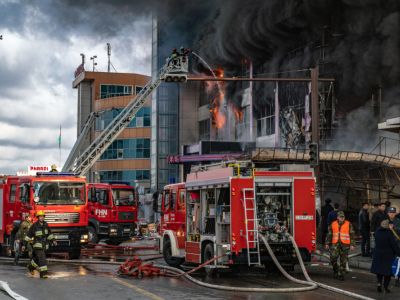With the United States preparing a wide-reaching campaign against global terrorism and already facing pressure for its support of militant anti-Israeli groups, Syria may be prepared to push for a political solution to the Mideast crisis, diplomats told AFP on Tuesday.
Syria has already condemned the devastating terrorist attacks which leveled the World Trade Center in New York and damaged the Penatgon, and which are believed to have killed some 6,000 people.
But things will become more complicated if Washington as expected expands its retaliatory campaign beyond its main suspect, Saudi-born dissident Osama bin Laden, and includes countries it accuses of sponsoring terrorism.
US Secretary of State Colin Powell is also looking toward Arab states to build a global anti-terrorism coalition to back the US retaliation that could include an invasion of Afghanistan, whose ruling Taliban militia harbors the suspected mastermind of the attacks, Islamic militant Osama bin Laden.
Syria is on the US list of state sponsors of terrorism for supporting radical Palestinian groups and Lebanon's Shiite militia Hezbollah which have launched bloody suicide bombings against civilian targets.
It insists the groups form part of a legitimate resistance movement against Israel's occupation of Arab lands, but the new US anti-terrorist campaign means that Damascus will face some tough choices in its own region.
Official Syrian newspapers are arguing almost daily that the fight against terrorism must include all those who take "innocent" lives -- pointing at Israel's suppression of the year-long Palestinian uprising in the West Bank and Gaza Strip -- and also address "the causes of terrorism" such as injustices committed against the Arab people.
Syrian President Bashar al-Assad made the point to his US counterpart George W. Bush in a September 12 message that called for a "global agreement to eradicate terrorism in all its forms."
The country is also casting itself as an ally in the fight against such terrorism. The official media has repeatedly pointed out the ruling pan-Arab Baath party waged a bloody and highly successful all-out war against Islamic fundamentalists across the country in the 1980s.
They also remind that the Islamic fundamentalists were allied with the United States against communist factions in the early part of the decade.
However, these points may be too subtle for Washington, which is reportedly prepared to punish nations that do not renounce terrorism and may not buy into Syria's argument of "legitimate resistance" against the Jewish state.
"If the United States asks Syria to close the offices of the Palestinian organizations and cut its links with Hezbollah there will be a problem," one diplomat told AFP, asking not to be named.
A senior State Department official said Monday that Washington would wait to see what action Syria takes against Hezbollah and other groups that may have links to bin Laden's al-Qaeda network.
"If they are willing to take steps against the perpetrators of this act, it will be useful to have them with us," the official said.
And on Tuesday, the US ambassador to Syrian-dominated Lebanon pointedly reminded the country it was hosting "terrorist organizations" such as the Hezbollah and was looking to Middle East states to help stamp out terrorism.
In this difficult position, Syria may be considering a political solution to the Mideast conflict, despite the fact the Baath have made enmity of Israel state one of its central themes since it came to power in 1963.
"It will urge a political solution to the Arab-Israeli conflict," another diplomat told AFP, but adding that it was not likely to rein in the militant groups as long as Israel was occupying Arab lands -- DAMASCUS (AFP)
© 2001 Al Bawaba (www.albawaba.com)









